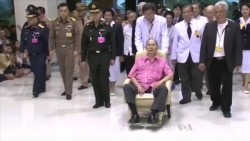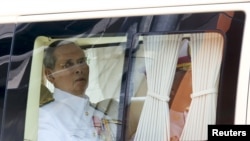Concern is mounting in Thailand about the condition of King Bhumibol Adulyadej, who has reigned since 1946.
His youngest child, Princess Chulabhorn, made an unusual public appeal last week for recitations of the Buddhist Pochangkaparitra healing prayer for her 87-year-old father, who has spent much of the past several years in a hospital in the capital.
King Bhumibol, also known as Rama IX, last appeared in public earlier this month when he briefly left his suite inside Siriraj Hospital. Since then, palace medical bulletins have noted blood infections, fever, and lung inflammation. He is said to have improved, but national anxiety persists.
The heir apparent, Crown Prince Maha Vajiralongkorn, has not attained the exalted level of adoration given to his parents.
On a scorching Sunday in mid-August he led a 43-kilometer mass bicycle ride in tribute to his ailing 83-year-old mother, Queen Sirikit. The nationally televised event, with more than 145,000 cyclists and 9,000 police officers, was seen as demonstrating to a nation under army rule that the military backs the crown prince to succeed his father.
Succession questions
“The people in power are from the Queen's Guard and we know that the queen has always endorsed the enthronement of her son,” explained Pavin Chachavalpongpun, an associate professor at Kyoto University and currently a distinguished fellow at Stanford University.
Although other military factions may have had mixed feelings about the heir apparent “they have to come to terms with the reality that the crown prince is the next king,” said University of Wisconsin professor of Southeast Asian history Thongchai Winichakul.
Thonghchai cautions that the status quo may not hold after King Bhumibol's death because there “are too many variables. I doubt if the military knows either.”
While the prince has been designated as the heir to the throne, he remains a more publicly remote figure whose private life has been a source of concern.
Some have speculated that his sister, Princess Sirindhorn, who is broadly admired for her philanthropic work and educational endeavors, could become a successor. But she has not been formally designated as an heir to the throne.
Bangkok's royalists are especially fond of Princess Sirindhorn, notes Pavin and this same group “may come out to question the suitability of the crown prince as we are approaching the royal transition.”
Also at stake is control of an estimated fortune of more than $35 billion in real estate.
Open discussion of the royal succession is taboo and related topics, such as any comment deemed to be critical of or threatening senior members of the royal family can result in lengthy prison sentences under Thailand's harsh lese majeste law.
The U.N. human rights office last month expressed concern about the criminal law, virtually unchanged since 1908.
“We are also alarmed at the spike in harsh prison terms delivered in such cases by the military courts, which themselves fail to meet international human rights standards, including the right to a fair trial,” said Ravina Shamdasani, a spokeswoman in Geneva for the Office of the High Commissioner for Human Rights.
Silencing discussion
According to Tyrell Haberkorn, a fellow in political and social change at the Australian National University, heavy sentences for social media postings signal the concern that the authorities have about dissent."
“What is notable about these cases is that they do not involve high-profile intellectuals or politicians, but rather ordinary people,” she said. “The prosecutions are similarly an attempt to intimidate ordinary people.”
Quoting or publishing remarks by others that could be deemed offensive are also subject to prosecution.
A reminder of this came Tuesday when The New York Times' international edition did not go to press in Thailand.
“It includes an article that our locally contracted printer deemed too sensitive to print," said Gina Wong, a customer care manager at the newspaper's office in Paris, in an e-mail sent to all subscribers in Thailand. "This decision was made solely by the printer and is not endorsed by the International New York Times.”
The 1,300-word article by the newspaper's Southeast Asia correspondent, Thomas Fuller, who is based in Bangkok, remains viewable online in Thailand.
Thai censors regularly block online content from overseas publications that contain what are considered unacceptable references to members of the royal family.
Monarchy at crossroads?
Bhumibol, who is revered as a demi-god in Thailand, is the only king most Thais have ever known. His passing will thrust the nation into deep mourning and may prompt prolonged soul-searching — and hushed discussion — about transformation of the centuries-old Chakri dynasty.
“The monarchy has two choices,” said Pavin, who was previously charged with lese majeste. It has to “adopt and adapt itself to the changing domestic and international environment — thus self-reform — or to resist the change and risk possibility of being irrelevant and collapse.”
“The Chakri dynasty has changed to the extent that it is unlikely to return to its 'good old days' anymore,” said Professor Thongchai, who was a student pro-democracy leader in 1970's Thailand. “Its future has begun about a decade ago. Do not give too much credit to or blame [the next monarch] Rama X.”
Thailand scholar Haberkorn says the respect and reverence that many Thais have for King Bhumibol “is specific to him as an individual, not the institution."
"Rama X will not be able to automatically slip into the same position held by Rama IX, even if he wears the same crown," she said. "The wildcard here is not who is going to ascend to the throne, but what citizens will do in that moment.”










